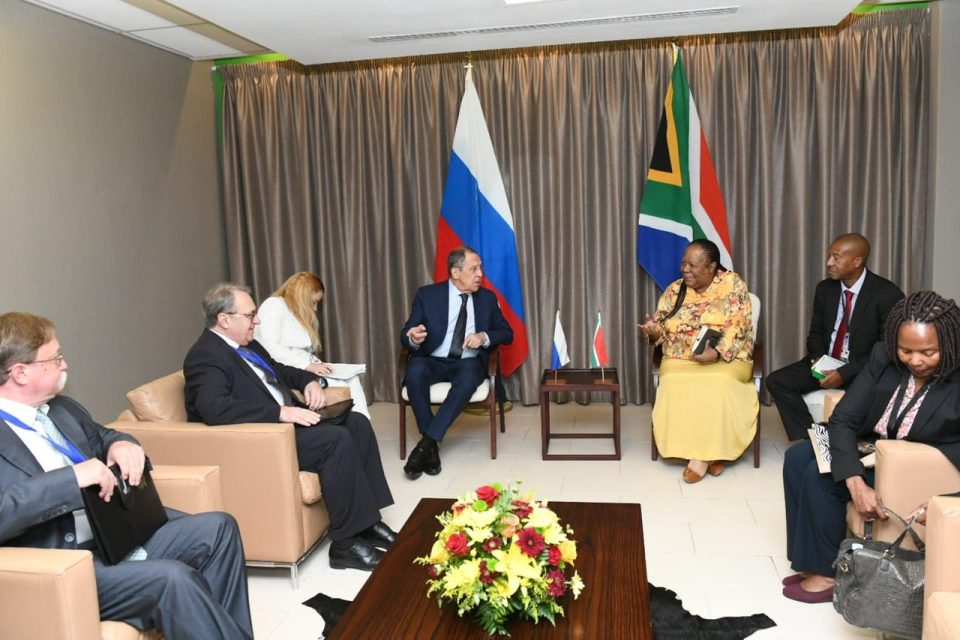For several months the war in Ukraine remained a silent topic in Africa. Russia and the West were competing for influence on the continent with deals and diplomatic support, but they rarely referred to their efforts to curry favor with the continent in the context of the Ukraine war. But it is different now.
Russian Foreign Minister Sergei Lavrov explicitly linked his travels to the war in his speech last week after his second mini-tour to the continent. He announced that his country is working to strengthen relations with most countries of the world, despite Washington’s attempts to create an atmosphere charged with hostility against Russia.
Lavrov made two trips to the countries of the continent in late January and early February, which included seven African countries. In contrast, US Treasury Secretary Janet Yellen visited only three countries. But these are only the most obvious signs of cooperation. What was once considered a political sideshow is now a real scramble for votes and support on the continent.
Africa has become a political battleground for Russia and the West since the invasion of Ukraine. The focus of this fight is twofold, first in presidential palaces across the continent where bilateral deals are struck. He also spoke in the atmosphere of the United Nations, in which competition for African votes had become intense.
The rush to Africa is real. And it may not be as great as the “all for Africa” message that Biden sent to African leaders
The United Nations held a vote condemning the Russian invasion last March, shortly after the invasion, and is seen as a test of world political opinion. The largest group that abstained was from the African continent. Half of the African countries abstained from the vote, which Moscow consoled.
Then, in September, Russia held referendums in four occupied regions of eastern Ukraine, paving the way for its full annexation. Nineteen African countries subsequently abstained from voting at the United Nations to condemn the annexation, an increase of two countries from voting in March.
This apparent success did not go unnoticed in the West, which still has some strong cards to play despite all the talk of its declining influence on the African continent. Washington played two cards in the fall when it re-summited the leaders of the United States and Africa after an eight-year hiatus.
Joe Biden has publicly endorsed two institutional changes that African countries have long demanded, first a seat for the continent in the Group of 20 richest economies, and second permanent seats for Africa on the United Nations Security Council.
While the first change has been in the works for some time (and may come this year) given the post-war push for better relations with Africa, the second change will be significant and seismic. Today the Security Council has five permanent members with veto power (and nuclear arsenals). Adding two more vetoers would radically change the balance of the council. It will also open the board to further change. It would be difficult to argue that India should not have a seat either.
The mere support of the American president for the continent’s demand remains important regardless of how such changes are managed. The foreign ministers of France and Germany endorsed this position last month.
This is smart policy because it forces Russia into a position where it needs to make clear whether it agrees to change as well. Moscow has so far refused to support change, something that could become a bigger sticking point in its relations with Africa.
Pretoria’s dilemma appears less acutely than across the continent. Should they support the general institutional changes that the West is offering in return for distancing themselves from Russia, or take advantage of the tangible bilateral relations that Moscow is now offering?
But this scramble to garner support has put individual African countries in difficult positions, as they seek to maximize available political opportunities while preparing for the day after war ends and squanders interest.
No country demonstrates this better than South Africa. She abstained from casting her vote in two UN votes last year. It was the only destination that Lavrov and Yellen visited in the last round, and only one day separated the two visits.
Pretoria’s dilemma appears less acutely than across the continent. Should they support the general institutional changes that the West is offering in return for distancing themselves from Russia, or take advantage of the tangible bilateral relations that Moscow is now offering?
Pretoria appears to have made that choice and agreed to host joint naval exercises with Russia and China, to kick off this week and extend into the anniversary of the start of the invasion. But it would be a mistake to take any of this as final. South Africa (like other countries) may be hedging its bets while remaining unwilling to commit to a side in a distant war.
The rush to Africa is real. It may not be as high as the “everything is for Africa” message that Biden sent to African leaders in December, but the continent is offered real and tangible political gains in exchange for political support in the Ukraine war.
Ironically, the tug-of-war proves Moscow’s central argument, which is that it is not alone in its confrontation with the West. Despite the suggestion that many African countries support Russia out of animosity toward the West, what remains more likely is that African countries are responding positively after long ignoring outside powers that are finally beginning to appreciate them.


